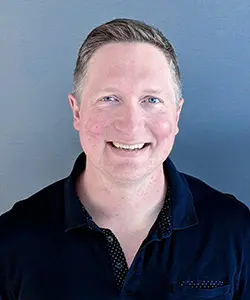 Ben Longmier
Ben Longmier
Benjamin W. Longmier (BSEP/physics ’04, MSEP ’05, PhDEP ’07)
CTO and co-founder, Swarm Technologies
We are honoring Ben as a nuclear engineer whose expertise in aerospace engineering has enabled him to found three companies focused on high-altitude/low-earth-orbit communications to accelerate the Internet of Things.
How did you choose engineering?
Engineering chose me. From a very early age, I was always tinkering around in the basement. My dad had a woodworking shop and was always building something. I minored in physics, and I think that offered the best synergy and intersection between physics, applied physics, and engineering.
And how did you choose to attend UW-Madison?
Growing up in Madison, going to UW-Madison is a natural extension. I had applied to a number of other schools, and I think UW-Madison had a really good offering. As an undergrad student, I had started working in Noah Hershkowitz’s lab, and when it came time to think about graduate programs, it was just a really nice extension into continuing that research.
Any professor or class that made a big impact on you?
I don’t think I can pick a single professor. I had a lot of good instructors who really cared about how students were doing and learning. I felt very fortunate for that. To pick two classes: My favorite classes were nuclear physics and ionizing radiation. They really caught my interest about learning about the natural world, but in a way that could be useful for a number of applications.
How did your experience in the College of Engineering influence your career path?
I’ve always been a really hands-on person. Madison had a lot of opportunities for getting involved in extracurricular clubs, working in machine shops, and as a student, working in labs. A lot of universities don’t necessarily have that many offerings on that front. When I was 16, I worked with Professor Riccardo Bonazza’s lab and learned a lot about engineering, experimental research, machining and experiment design. That was a really nice start to my professional career. When I enrolled as an undergrad, I sought out research activities in other labs and participated in organizations like the Zero G student group. We built the entire experiment from scratch, won the NASA proposal, and operated the device in microgravity on NASA’s Vomit Comet down in Houston.
Who played the greatest role in your achievements?
My PhD advisor, Professor Noah Hershkowitz, who unfortunately passed away in the last year, was by far the biggest influence for professional growth, personal growth, how to run a lab, how to run experiments, how to think about the universe, how to find meaningful results that can help the community and the profession.
What advice would you give students today?
Try to balance the academic work with hands-on professional development, either becoming involved in extracurricular clubs in engineering or elsewhere on campus, or doing an internship. The classroom setting is a good place to learn, but the real world is another step, and getting as much hands-on experience when you’re really young is probably the most helpful.
Any hobbies?
I have an airplane out here in California and we fly around to neighboring airports in Napa and Sonoma, Santa Monica, and along the coast. So I have a blast. I actually learned to fly in Wisconsin, out over the Wisconsin River practice area.
Anyone you’d like to mention?
My dad was ever-present, and growing up, he did a really good job of fostering my love for education and love for spending time in a lab.